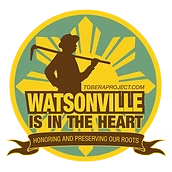
1930 anti-filipino WATSONVILLE RACE RIOTS
THE RACE RIOT CULMINATED IN THE SHOOTING AND KILLING OF FERMIN TOBERA
Tensions escalated as 500-white men armed with pistols and clubs roamed the streets of Watsonville in an act of mob violence in a five-day stretch towards the end of January in 1930. The malicious act consisted of assaulting and beating Filipino farm workers who they claimed stole their jobs and their women. The Race Riot culminated in the shooting and killing of Fermin Tobera who was shot dead while sleeping in a San Juan Road labor camp.
White men asserted that these new young immigrants, who were recruited to build the regions fertile and budding multi-billion-dollar agricultural business, were stealing their jobs – jobs they did not want to do themselves. The work was tedious, demanding and took skill. Filipinos were willing to work for low wages and endure poor working conditions. Filipinos, largely young men, came after the Spanish- American War where the United States was awarded the Philippines as a Colony. They came under the guise of seeking better opportunities. Little did they know that they would have to persevere through very difficult working conditions and turbulent racial unrest, prejudice and discrimination. As young immigrants, these Filipinos had minimal funds and had to survive through their own conviction and determination. They were also very suave, handsome, dapper and polite, especially to the young ladies in town. For every 30 Filipino males there was one Filipina.
Filipino’s organized “taxi dances” mostly at Palm Beach, where local white women would dance with Filipino men as a source of generating money in the Depression Era. This propagated the term “A Dollar A Day, A Dime a Dance.” This also fueled the ire of local white men who may have felt disgraced and rejected knowing that these “little brown men” were mingling with their own ethnic group that added to the tension and unrest.
Prior to WWII and Civil Rights, Filipinos were not allowed to marry outside of their own race, could not vote, buy land and were designated to live in certain areas of town. It was common to see signs reading "No Filipinos Allowed” in cafes, restaurants, boarding houses and businesses. They had to rely on one another for support and stability.
IMPORTANT UPDATE:
Members of the Tobera Project including former Mayor Manuel Bersamin advocated to the Watsonville City Council to pass a resolution to formally apologize to the Filipino American Community for the 1930 Anti-Filipino Watsonville Race Riots. At the November 10, 2020 City Council Meeting under the leadership of Mayor Rebecca J. Garcia, the City Council unanimously passed the apology resolution.
